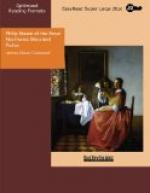Philip stared at him in amazement.
“If I didn’t,” he went on, rubbing his hands again over the stove, “I’d follow your suggestion, and go to bed. As it is, I’m going to tell you why I’m up here, on your word of honor to maintain secrecy. I’ve got a selfish end in view, for you may be able to assist me. But nothing must go beyond yourself. What do you say to the condition?”
“I will not break your confidence—unless you have murdered some one,” laughed Philip, stooping to light a fresh pipe. “In that event you’d better keep quiet, as I’d have to haul you back to headquarters.”
He did not see the deepening of the flush in the other’s face.
“Good,” said the doctor. “Sit down, Steele. I take it for granted that you will help me—if you can. First I suppose I ought to confess that my name is not Boffin, but McGill—Dudley McGill, professor of neurology and diseases of the brain—”
Philip almost dropped his pipe. “Great Scott, and it was you who wrote—” He stopped, staring in amazement.
“Yes, it was I who wrote Freda, if that’s what you refer to,” finished the doctor. “It caused a little sensation, as you may know, and nearly got me ousted from the college. But it sold up to two hundred thousand copies, so it wasn’t a bad turn,” he added.
“It was published while I was away,” said Philip. “I got a copy in Rio Janeiro, and it haunted me for weeks after I read it. Great Heaven, you can’t believe—”
“I did,” interrupted the doctor sharply. “I believed everything that I wrote—and more. It was my theory of life.” He sprang from his chair and began walking back and forth in his quick, excited way. The flush had gone from his face now and was replaced by a strange paleness. His lips were tense, the fingers of his hands tightly clenched, his voice was quick, sharp, incisive when he spoke.
“It was my theory of life,” he repeated almost fiercely, “and that is the beginning of why I am up here. My theory was that there existed no such thing as ‘the divine spark of love’ between men and women not related by blood, no reaching out of one soul for another—no faith, no purity, no union between man and woman but that could be broken by low passions. My theory was that man and woman were but machines, and that passion, and not the love which we dream and read of, united these machines; and that every machine, whether it was a man or a woman, could be broken and destroyed in a moral sense by some other machine of the opposite sex—if conditions were right. Do you understand me? My theory was destructive of homes, of happiness, of moral purity. It was bad. I argued my point in medical journals, and I wrote a book based on it. But I lacked proof, the actual proof of experience. So I set out to experiment.”
He seemed to have forgotten now that Philip was in the room, and went on bitterly, as if arraigning himself for something which he had not yet disclosed.




